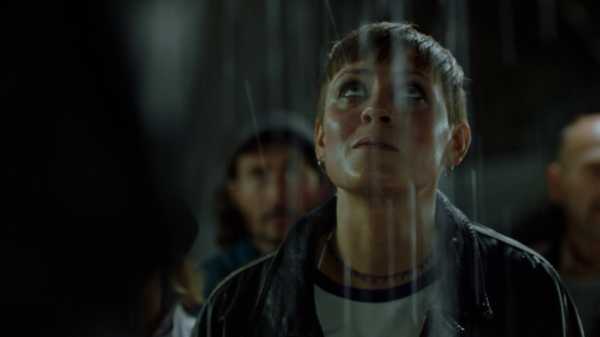
“Reckless” is an amusing interpersonal drama about the interminable ebb and flow of relationships, set in a drab twenty-second century in which the consequences of our species’ climate inaction have become incredibly clear.
For miles, there is only the ocean, inky gray waves under an equally dismal sky. Rain comes down in sheets. Then, as we dive beneath, we notice a world that once was ours. Submerged buildings jut up toward the water’s surface, the detritus of industrial society giving way to fish and kelp. Farther down, through a maze of sunken infrastructure and sediment and a whirring vent, lies what’s left of humanity—as far as we can tell. The confident opening sequence of Pella Kågerman’s short film transports viewers to life in a damp, dystopian future. There are still convenience stores, of course—a vending machine proffers tins of Vitamin D tablets, and brightly colored snack bags line the walls. Outside the store, a crowd gathers, gazing fretfully at a leak in the ceiling.
None of this matters to Nikki, though. She just got dumped and isn’t taking it well. How would you feel if you lived in a dank underwater shelter and your boyfriend said that he needed more space? One of six films in a Swedish Film Institute program that imagines the world in the year 2121, “Reckless,” written and directed by Kågerman, is an amusing interpersonal drama about the interminable ebb and flow of relationships, set in a drab twenty-second century in which the consequences of our species’ climate inaction have become incredibly clear.
Kågerman shot the film mostly at her local Stockholm blue-line subway station. The sturdy concrete-and-metal surroundings brim with existential nervousness, but, to Nikki, the potential end of civilization is merely a backdrop to her efforts to reconnect with Rickard, her ex. “We took her tunnel vision to the extreme,” Kågerman told me in an e-mail. “I mean, I’ve never sat at home drawing images of an ex with a crown of penises. . . . But I’ve definitely been tunnel-visioned, not only when it comes to love. I think most people have difficulties seeing the bigger picture.”
Rickard is nice enough—but it’s odd that Nikki dedicates such time and energy to reclaiming a man who seems basically unremarkable. “It’s more about wanting someone not wanting you. And only wanting them when they don’t want you, because when you have them you’re bored to death, or you start to take them for granted,” Kågerman said. Underwater for so long, the people wish upon water droplets instead of stars. With every new leak she spies, Nikki pauses to quickly mumble a few words under her breath, and her wish appears to be granted when Rickard shows up on the stairs by her apartment, holding a bag of her clothes and asking her to coffee.
The second Nikki gets what she desires, though, the Earth steps in to remind us that, unlike Rickard, it cannot be swayed by neat gestures of affection. There are laws of motion and heat and physics that were here long before we were.
“For a long time, I had a very pretentious sentence from Proust as the working title,” Kågerman said, “and it goes something along the line—this is my poor translation from Swedish—‘You Only Love What You Don’t Own.’ I think most of us have that exact relationship to Earth. Somehow, we take her for granted. We think she belongs to us. It’s quite crazy.”
Sourse: newyorker.com






